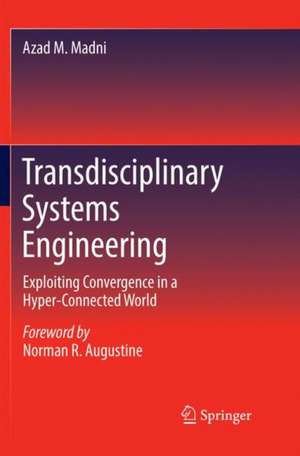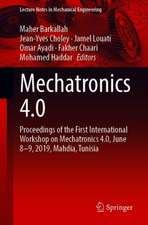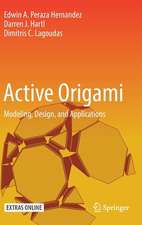Transdisciplinary Systems Engineering: Exploiting Convergence in a Hyper-Connected World
Autor Azad M. Madnien Limba Engleză Paperback – 26 aug 2018
This book explores the ways that disciplinary convergence and technological advance are transforming systems engineering to address gaps in complex systems engineering: Transdisciplinary Systems Engineering (TSE). TSE reaches beyond traditional disciplines to find connections—and this book examines a range of new methods from across such disparate areas of scholarship as computer science, social science, human studies, and systems design to reveal patterns, efficiencies, affordances, and pathways to intuitive design. Organized to serve multiple constituencies, the book stands as an ideal textbook supplement for graduate courses in systems engineering, a reference text for program managers and practicing engineers in all industries, and a primary source for researchers engaged in multidisciplinary research in systems engineering and design.
| Toate formatele și edițiile | Preț | Express |
|---|---|---|
| Paperback (1) | 569.51 lei 38-44 zile | |
| Springer International Publishing – 26 aug 2018 | 569.51 lei 38-44 zile | |
| Hardback (1) | 781.78 lei 38-44 zile | |
| Springer International Publishing – 17 oct 2017 | 781.78 lei 38-44 zile |
Preț: 569.51 lei
Preț vechi: 739.62 lei
-23% Nou
Puncte Express: 854
Preț estimativ în valută:
108.99€ • 113.37$ • 89.98£
108.99€ • 113.37$ • 89.98£
Carte tipărită la comandă
Livrare economică 10-16 aprilie
Preluare comenzi: 021 569.72.76
Specificații
ISBN-13: 9783319872506
ISBN-10: 3319872508
Pagini: 212
Ilustrații: XVII, 212 p. 47 illus., 34 illus. in color.
Dimensiuni: 155 x 235 mm
Ediția:Softcover reprint of the original 1st ed. 2018
Editura: Springer International Publishing
Colecția Springer
Locul publicării:Cham, Switzerland
ISBN-10: 3319872508
Pagini: 212
Ilustrații: XVII, 212 p. 47 illus., 34 illus. in color.
Dimensiuni: 155 x 235 mm
Ediția:Softcover reprint of the original 1st ed. 2018
Editura: Springer International Publishing
Colecția Springer
Locul publicării:Cham, Switzerland
Cuprins
21st Century Imperatives.- Thinking Different.- Disciplinary Convergence.- Disruptive Collaboration.- From Models to Stories.- Generating Novel Options.- Human Performance Enhancement.- Design Elegance and Systems Engineering.- Affordable Resilience.- Autonomous System-Of-Systems.- Looking To The Future.
Notă biografică
Dr. Azad Madni is the Executive Director of University of Southern California’s flagship program in Systems Architecting and Engineering, and a Professor in USC’s Viterbi School of Engineering, with courtesy appointments in the schools of medicine and education. He is the founder and CEO of Intelligent Systems Technology Inc., a high-tech R&D company specializing in cross-disciplinary approaches to complex systems engineering. He received his BS, MS, and PhD degrees in Engineering from UCLA. His research in intelligent systems, complex systems engineering, and human-technology integration has been sponsored by several government research agencies in DOD, DHS, DOE, DOC, and NASA, as well as aerospace and automotive companies. He has received several prestigious awards and honors from professional engineering societies, industry, and academia including the 2011 INCOSE Pioneer Award and 2016 Lifetime Achievement Award and Visionary Systems Engineering Leadership Award from Boeing for his impact on the aerospace industry and the nation. He is a Life Fellow of IEEE, IETE, and SDPS and Fellow of AAAS, AIAA, and INCOSE. He is the co-author of Tradeoff Decisions in System Design (Springer 2016). Heis the co-founder and current Chair of IEEE SMC Society’s Technical Committee on Model Based Systems Engineering. He has served as the Los Angeles venue host, organizer and General Chair of the Conference on Systems Engineering Research (CSER) since 2008. His research interests include probabilistic system modeling and machine learning, mutual adaptation and learning in cyber-physical-human systems, and model-based methods for architecting and engineering cyber-secure systems and system-of-systems.
Textul de pe ultima copertă
This book explores the ways that disciplinary convergence and technological advance are transforming systems engineering to address gaps in complex systems engineering: Transdisciplinary Systems Engineering (TSE). TSE reaches beyond traditional disciplines to find connections—and this book examines a range of new methods from across such disparate areas of scholarship as computer science, social science, human studies, and systems design to reveal patterns, efficiencies, affordances, and pathways to intuitive design. Organized to serve multiple constituencies, the book stands as an ideal textbook supplement for graduate courses in systems engineering, a reference text for program managers and practicing engineers in all industries, and a primary source for researchers engaged in multidisciplinary research in systems engineering and design.
- Introduces a bold, new vision of where model-based systems architecting and engineering is headed;
- Maximizes reader understanding of recent advances in social networks, collaboration technologies, interactive storytelling, virtual worlds, and systems design that enable transdisciplinary systems engineering;
- Illustrates convergence among disciplines across social, human, and applied sciences with robust examples;
- Facilitates creation of new courses in systems architecting and engineering by structuring each chapter as an independent resource, allowing the content to be presented in order of academic need.
Azad Madni has eloquently and substantively addressed one of the most important issues facing 21st Century systems engineering and design. The author makes it clear that an environment of autonomous systems, system of systems, and the internet of things will require that we are able to apply more than math and science to solve thorny problems. They will necessitate that systems engineers and designers have an understanding of the intricate interactions that can exist between technology and humans.
John Brooks Slaughter, Ph.D., P.E., NAE
Professor of Education and Engineering
University of Southern California
President Emeritus, Occidental College
Chancellor Emeritus, U. of Maryland
Caracteristici
Introduces a bold, new vision of where model-based systems architecting and engineering is headed Maximizes reader understanding of recent advances in social networks, collaboration technologies, interactive storytelling, virtual worlds, and systems design that enable transdisciplinary systems engineering Illustrates convergence among disciplines across social, human, and applied sciences with robust examples Facilitates creation of new courses in systems architecting and engineering by structuring each chapter as an independent resource, allowing the content to be presented in order of academic need






















